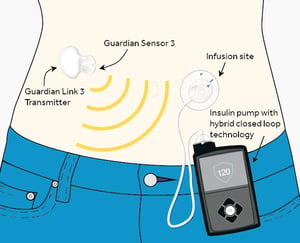Since November is National Diabetes Month, we're exploring topics on this disease which currently effects nearly 30.3 million Americans. This third and final blog discusses how to manage diabetes.
How Does Someone Manage Diabetes?
The key to managing Type 1 Diabetes is to follow MED, which stands for:
- Medication: Medication in the form of insulin in order to lower and control blood glucose level.
- Exercise: Physical activity in order to lower and control glucose level in the bloodstream.
- Diet: Dietary guidelines, such as counting carbohydrates or watching your glycemic index, in an attempt to avoid significant spikes in blood glucose.
The key to managing Type 2 Diabetes is to follow DEM, which stands for:
- Diet: Dietary modifications of food intake and calorie consumption.
- Exercise: Physical activity in order to achieve weight loss.
- Medication: Medication in order to achieve a stable blood glucose level.
What Tests Can Be Done to Manage Diabetes?
There are several tests people with diabetes can take to help them monitor and manage their diabetes, including:
- Self-blood glucose monitoring (SBGM): This test, which should be taken at least twice a day, can be administered using a home glucose meter allowing the person to easily monitor their blood sugar quickly and easily.

- Insulin infusion pump: This test uses a medical device that involves inserting a small needle in the upper layer of the skin for a few days. The needle is connected to a syringe infuser, which is then connected to a device that can be programmed to administer a continuous dosage of insulin in order to mimic the function of a healthy pancreas. However, this device is also able to administer an additional amount of insulin in anticipation of the amount and type of food that person intends to eat at mealtime.
- Postprandial blood sugar (PPBS): This is a blood glucose test that helps determine the amount of sugar in the blood after a meal. This test measures the sugar in the blood two hours after eating a meal because blood sugar levels typically drop back to normal by then. However, for those who suffer from diabetes, this serves as a test on whether or not they're able to manage their blood sugar levels.
- Hemoglobin A1c: This test involves the collection of a blood sample through venipuncture and measures what that person’s blood glucose level was around 2-3 months beforehand when red blood cells were released from the bone marrow.
Where Can I Find More Information On Diabetes?
The American Diabetes Association is an excellent source of information to learn more about this chronic condition. They cover topics including how to know if you could be suffering from diabetes, how to live with this condition, food and fitness management, research & practice, way to give, and more.
If you’re interested in a career in the healthcare field, perhaps you should consider becoming a nurse. Currently, Hocking College in Nelsonville, Ohio, offers both a Registered Nursing program and a PN2RN transition program.
For more information on any of these programs, contact the Hocking College Admissions Office at (740) 753-7050.



